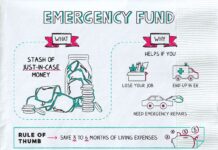The Internal Revenue Service or IRS is likely to add penalties or interest on explicit actions that you take or fail to take. Over 150 civil penalties are provided in the Internal Revenue Code. You must also be aware that the penalties on tax are expensive and are not tax deductible. Following is a list of 10 most common Tax Penalties and the ways in which you can avoid them:-
#1 Health Mandates
Penalties are imposed according to the Affordable Care Act on those who fail to carry health coverage and on the large employers who do not provide coverage to their full-time employers. Look for the developments in Congress for the American Health Care Act to avoid this penalty, since it may be waived by the new law.
#2 Non-medical Distribution Penalty
If you take out a distribution from a health savings account to pay for expenses that are non-medical, you will have to pay a 20% penalty. To avoid this, restrict your distributions to medical expenses. Else, you may wait until the age of 65, when the penalty does not apply anymore.
#3 Early Distribution Penalty
If you tap on a retirement plan too early, you will have to pay a 10% penalty that is usually valid before the age of 59½. If you are in need of funds prior to this age, then look for them elsewhere. Otherwise, find out the exceptions to the penalty enlisted in IRS Publication 590-B.
#4 Excess Contribution Penalty
If you add more than the law allows to the retirement plan, you will have to pay a 6% excess contribution penalty every year. To avoid the penalty, calculate your contributions. In case the amount is larger than the limit, withdraw the excess money.
#5 Accuracy-related Penalties
If an underpayment of taxes is substantial and results from disregard or negligence of the rules, then you will have to pay a 20% penalty. To avoid such penalties, you must always keep a record of your business. You may also consider consulting a tax professional for good advice.
#6 Trust Fund Penalty
As an employer, if you do not deposit the withholding from employees’ compensation with the U.S. Treasury, you may be held altogether personally liable for the funds that you fail to deposit. To avoid the Trust Fund Penalty, you must always verify that all your deposits have been made.
#7 1099 Mistakes
 The later you submit the Form 1099, the more you will be charged. Therefore, always check the deadline for the 1099 you are obliged to file since there are different deadlines for its different types.
The later you submit the Form 1099, the more you will be charged. Therefore, always check the deadline for the 1099 you are obliged to file since there are different deadlines for its different types.
#8 W-2 Mistakes
In case you do not file Form W-2 for each employee, or you make a mistake and fail to correct it, you will be penalized. The tardy you are, the more you will be charged. Therefore, always keep in mind your deadlines of the forms and transmit them to the Social Security Administrators after furnishing the employees with their W-2s.
#9 Estimated Tax Penalty
Interest will be charged based on the IRS rate for any underpayment of income taxes. To avoid these charges, you must recheck your estimates every time you make installments and review the estimated tax safe harbors.
#10 Late Filing Penalty for Tax Returns
The deadline of April 15 might be sealed in your mind as tax day. However, this is not true for all the returns. Certain partnerships and corporations have a deadline of March 15. The penalty for getting late is 5% of whatever you own for every month you are late. Thus, you must always verify the deadline of your return. In case you are unable to meet the deadline, you may ask for filing an extension by the deadline.
The above-stated penalties are 10 most common Tax Penalties of the 150 stated in the IRC. And these are only some of the ways to avoid penalties. Remember, to minimize all the penalties, you must confirm the deadlines beforehand and read the rules and regulations for the task that you are going to do. This will save your money and time and leave you anxiety-free.











